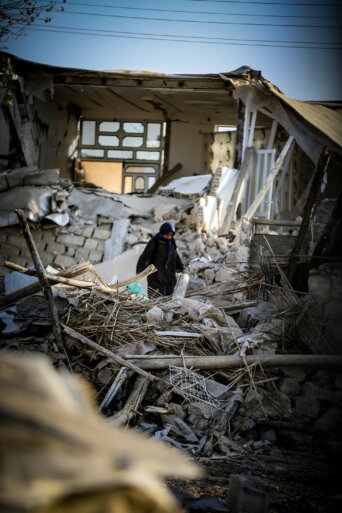- About
- Topics
- Picks
- Audio
- Story
- In-Depth
- Opinion
- News
- Donate
- Signup for our newsletterOur Editors' Best Picks.Send
Read, Debate: Engage.
| topic: | Humanitarian Aid |
|---|---|
| located: | Afghanistan |
| editor: | Shadi Khan Saif |
In mountainous villages in Afghanistan’s Paktika province, the earth jolted below the inhabitants’ feet with such force that entire roofs collapsed. However, the sanctions imposed on the country made it difficult for crucial first aid-response to arrive.
The misplaced geostrategic policies of the West have created such a mess in Afghanistan that its poorest inhabitants are suffering silently with no sign of respite.
The Taliban authorities – brought to power by the US through the Doha Agreement – are unable to govern and deliver services, even if they wanted to, because of the sanctions imposed by Western nations, not to mention the freeze on Afghan state funds, worth billions of dollars, kept confiscated by Washington as a tool for leverage.
There are nearly 40 million people living in this country in the heart of Asia who are technically, diplomatically and financially cut-off from the entire world due to the US’ policies. Afghanistan was used as a scapegoat in the Cold War against the Soviet Union in the 1970s and 1980s, and was later abandoned and turned into an aid-dependent country.
The devastating earthquake in the Paktika and Khost provinces has left behind tragic tales that would continue to haunt the consciousness of all world citizens once they realise what their countries have done by collaborating in the abandonment of Afghanistan or by remaining silent.
Aid agencies are struggling to provide relief and rescue to the hundreds of men, women and children due to a shortage of funds. A UN official told me that the donor countries were lagging behind on key pledges against crucial appeals made when Afghanistan was undergoing the worst humanitarian crisis a few months ago.
The Afghan diaspora around the world, as well as the local community groups on the ground, are grappling with similar issues, stemming from sanctions and the lack of recognition of the government. The earthquake has just served to draw some international attention back to the miseries faced by Afghans.
The sudden rush to exit by the US and the Taliban’s rise to power has created a terrible vacuum, resulting in the sinking of the economy and crippling of all services. On top of that, Afghanistan is reeling from unprecedented impacts of global warming and climate change in the form of untimely rains and floods, destroying crops after long spells of devastating droughts and creating hunger and desperation at an extreme level.
If Afghanistan is in such a terrible state now, after decades of international engagement, we need to be asking ourselves and our governments for sincere clarifications about the previous and current nature of engagement with the country and its people.
Photo by Moein Rezaalizade

